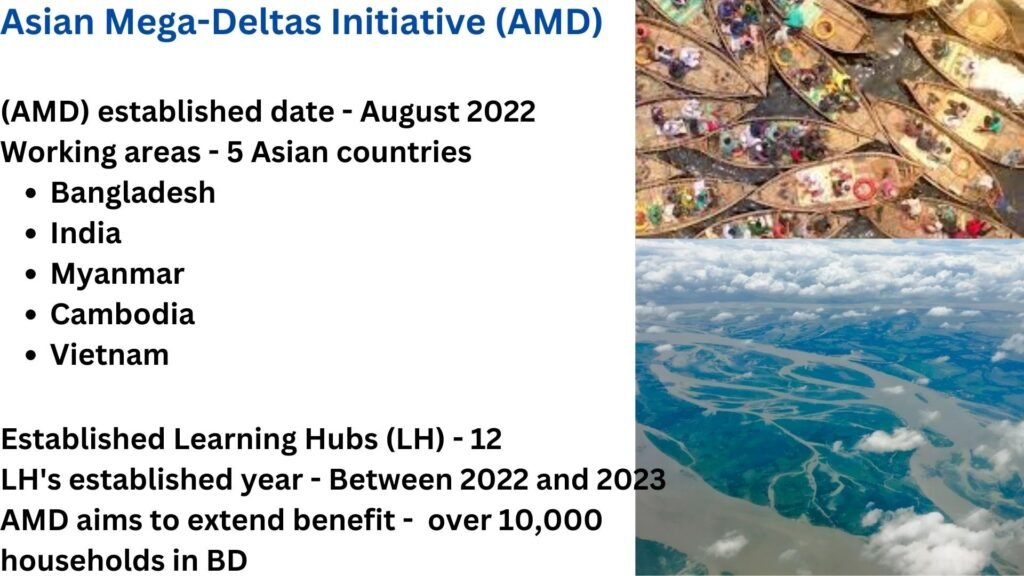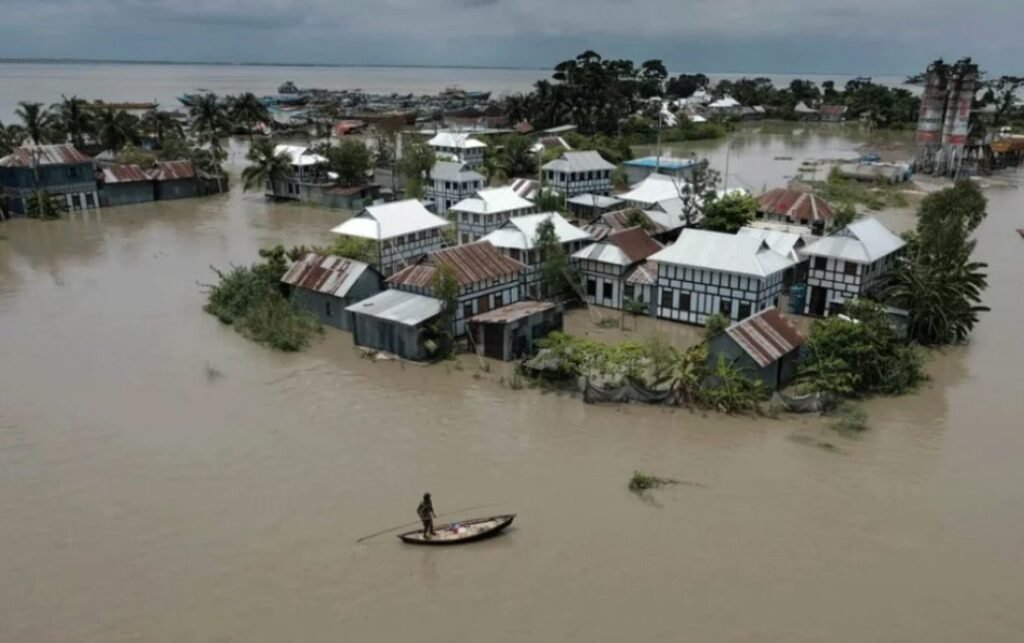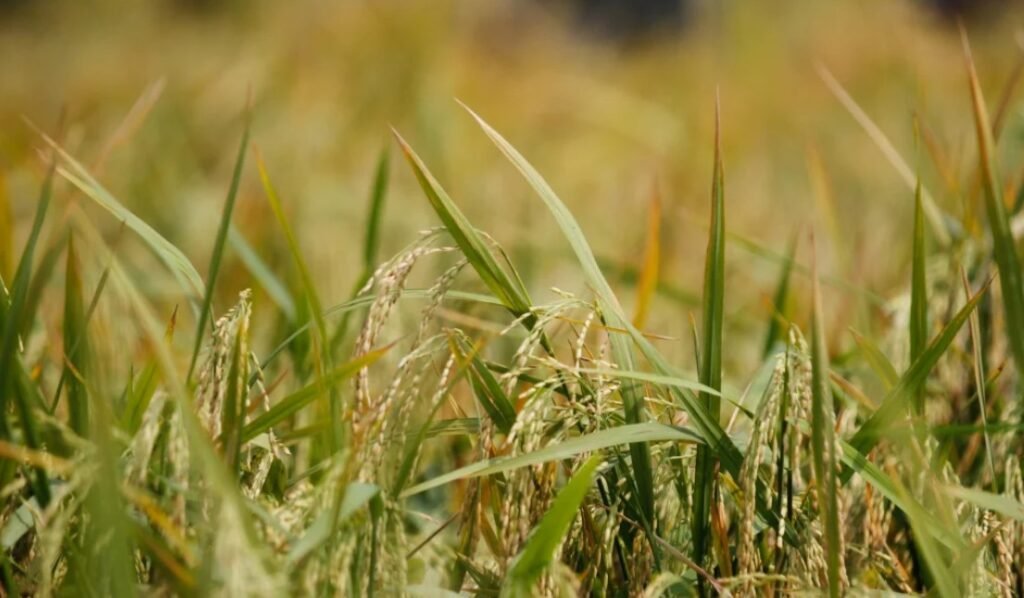Through innovative approaches and collaborative efforts, it not only enhances agricultural productivity but also fosters inclusive and sustainable development, paving the way for a brighter future amidst environmental challenges
The Asian Mega-Deltas Initiative in Bangladesh aims to address the multifaceted challenges posed by rapid urbanization, climate change, and environmental degradation in the delta regions of Asia, particularly focusing on Bangladesh. With approximately 70% of Bangladesh’s population residing in these delta areas, the initiative prioritizes sustainable development, resilience-building, and environmental conservation.
Key objectives include enhancing disaster preparedness through improved infrastructure and early warning systems to mitigate the impact of cyclones, floods, and sea-level rise. Additionally, the initiative seeks to promote sustainable urban planning and management to address issues like overcrowding, inadequate housing, and insufficient infrastructure in delta cities.
Moreover, it aims to safeguard ecosystems and biodiversity by implementing measures to combat pollution, restore mangroves, and preserve coastal habitats. Community engagement and capacity-building are integral to the initiative, fostering local participation in decision-making processes and empowering communities to adapt to environmental changes effectively.
Ultimately, the Asian Mega-Deltas Initiative endeavors to foster inclusive and sustainable development, ensuring the resilience and well-being of communities in Bangladesh’s delta regions amidst evolving environmental challenges.
Road Map of the Asian Mega-Deltas Initiative
The Consultative Group on International Agricultural Research (CGIAR), in collaboration with government agencies and other relevant stakeholders, initiated the ‘Initiative on Securing the Food Systems of Asian Mega-Deltas for Climate and Livelihood Resilience (AMD)’ in Dhaka in August 2022. The initial phase of the AMD initiative (2022-24) concentrated on promoting resilient, inclusive, and productive Asian Mega-Deltas, with a particular focus on the Ganges-Brahmaputra Delta in Bangladesh and India, Irrawaddy Delta in Myanmar, and Mekong River Delta in Vietnam and Cambodia.
In late February and early March of this year, the annual meeting of the CGIAR Initiative on AMD took place in Dhaka, signaling optimism for its extension into a second three-year cycle (2025-27). Thousands of farming households, especially in the saline-prone regions of the south and southwestern coastal belts of Bangladesh, stand to benefit from the AMD initiative. Notably, Bangladesh’s coastal polder zone alone encompasses 1.2 million hectares of farmlands.
Headquartered in Montpellier, France, CGIAR represents the largest global agricultural innovation network. Comprising non-profit research organizations, CGIAR Research Centers, with over 9,000 scientists, researchers, technicians, and staff, strive to revolutionize food, land, and water systems amidst a climate crisis.
The CGIAR Initiative on Asian Mega-Deltas endeavors to foster resilient, inclusive, and productive deltas that preserve socio-ecological integrity, adapt to climate-related stressors, and bolster human prosperity and well-being. With a population of 177 million, the densely populated Asian mega-deltas serve as biodiverse, fertile, and productive food baskets dominated by rice, fisheries, and aquaculture. These deltas hold immense potential for enhancing regional food systems’ sustainability, benefiting millions beyond the delta dwellers themselves.
“We have completed or are near completing some basic work of mapping crop suitability, risks, and adaptation options in the coastal ecosystem. This is very important for further planning and development of the region.”
– Dr Bjoern Ole Sander, AMD Initiative’s Lead

Focus Areas Of The Asian Mega-Deltas
The CGIAR Initiative on Asian Mega-Deltas endeavors to pinpoint, amalgamate, assess, adapt, and expand technical, institutional, and policy innovations across a spectrum of endeavors concentrated on five specific areas:
Enhancing Deltaic Production Systems: Collaborating with farmers and local authorities to recognize, amalgamate, assess, and expand interventions ensuring systems can adjust to and alleviate the impacts of climate change.
Cultivating Nutrition-Sensitive Deltaic Agrifood Systems: Advocating for sustainable production and consumption of nutritious foods, engaging institutional stakeholders in devising investment strategies and interventions.
Mitigating Risks In Delta-Oriented Value Chains: Utilizing digital climate advisory and ancillary services, involving stakeholders at all tiers to diminish climate risks among smallholders (including women and youth), and facilitating investment in deltaic value chains.
Promoting Inclusive Deltaic Food-Systems Governance: Enhancing the capacities of national, provincial, and local entities to devise, draft, and execute more sustainable food systems, and improving inclusivity and accountability of public and private agricultural-related investments and interventions in the Asian mega-deltas.
Implementing Evidence-Based Delta Development Planning: Enhancing the formulation of climate-resilient and inclusive food systems in Asian mega-deltas through evidence-supported policy discourse and strategic planning, integrating dual adaptation/mitigation development options in national and sub-national planning for the deltas.
Empowering Coastal Bangladesh Farming Communities
The Asian Mega-Deltas Initiative (AMD), currently in its third year of operation across five Asian countries – Bangladesh, India, Myanmar, Cambodia, and Vietnam – has devised a climate-resilient year-round production system. This system holds the potential to double farm productivity within Bangladesh’s coastal polder zone, spanning 1.2 million hectares of farmland. The polders, comprising 162 encircled embankments primarily constructed during the early 1960s, face increasing threats to agricultural productivity due to rising salinity levels. Through collaborative efforts with policy planners and local farmers in south and southwest Bangladesh, the AMD initiative has fostered agricultural innovations. Specifically, during the dry season, AMD introduced maize and sunflower crops, which demonstrated superior resilience compared to conventional crops.

Between 2022 and 2023, AMD established 12 Learning Hubs (LH) in five polders located in the south-west (Khulna) and south-central (Barishal) coastal zones of Bangladesh, covering 105 hectares of land. LH farmers evaluated five improved cropping patterns, including high-yielding varieties (HYV) of rice in the wet/aman season, followed by maize, sunflower, mungbean, chili, and okra in the dry/rabi season. Regular monitoring of river water salinity prompted suggestions for the water management group to open sluice gates when salinity levels permitted rice cultivation during the Aman season.

The empowerment of water management groups and LH farmers focused on enhancing the water environment for HYV rice cultivation and optimizing fertilizer management during critical growth stages. This was achieved through the systematic operation of sluice gates, synchronized with the tidal phenomenon of the peripheral rivers within the polder ecosystem. LH farmers evaluated four newly released climate-resilient and zinc-biofortified HYV rice varieties during the aman seasons of 2022 and 2023. The mean yield of HYV rice reached 5.0 t/ha, surpassing neighboring farmers’ yields of traditional and HYV rice varieties, which averaged 2.4 t/ha and 4.2 t/ha, respectively.
The introduction of HYV rice in the aman season enabled farmers to commence cultivation of dry/rabi season crops at least a month earlier than traditional practices, ensuring harvest before the pre-monsoon or cyclonic season. Semi-mechanized cropping practices were introduced for maize and sunflower cultivation, with seeds sown by dibbling on moist soil. Harvesting of dry season crops occurred before the onset of adverse weather conditions. Consequently, HYV rice followed by semi-mechanized maize and sunflower cultivation emerged as the most climate-resilient cropping practices for Bangladesh’s coastal polder zones. Maize and sunflower yields averaged 5.0 t/ha and 2.0 t/ha, respectively, while green chili, mungbean, and okra yields reached 6.1 t/ha, 1.2 t/ha, and 5.5 t/ha, respectively.

Overall, the improved cropping patterns resulted in productivity gains two to three times higher than traditional farming practices. Knowledge gained from these endeavors was disseminated among various stakeholders, including farmers, community leaders, input dealers, students, teachers, government officials, NGO personnel, and the mass media.
AMD aims to extend its reach and benefit over 10,000 households in Bangladesh through climate advisory and nutrition awareness programs, along with enhanced agronomic guidance, by the end of its initial cycle. Furthermore, the initiative targets more than 100,000 households across all AMD countries, leveraging successful strategies implemented in Vietnam. These ambitious goals will be achieved through robust partnerships with scaling partners, both national and international, as AMD recognizes that such objectives cannot be accomplished in isolation.
In conclusion, the CGIAR Initiative on Asian Mega-Deltas, particularly its AMD component, stands as a beacon of hope for the resilience and prosperity of millions residing in vulnerable deltaic regions. Through innovative approaches and collaborative efforts, it not only enhances agricultural productivity but also fosters inclusive and sustainable development, paving the way for a brighter future amidst environmental challenges. As the initiative progresses into its next phase, its impact is poised to expand, benefiting countless more households across the Asian mega-deltas.


